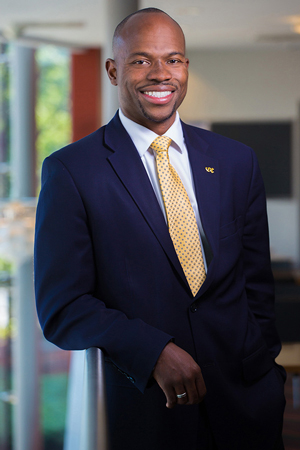M. Brian Blake has coupled his talents in coding, engineering and as a professor to be recognized as a distinguished professional in higher education. As Executive Vice President for Academic Affairs and the Nina Henderson Provost at Drexel University, Blake holds a key leadership position at one of the nation’s leading research universities. In this role, Blake is in charge of all academic programs and students, admissions, the medical school and all internal operations of the university. Blake was named Provost and Executive Vice President in April of 2015. Concurrent to his senior administrative role, he also provides oversight to a select group of advanced degree candidates and recently graduated his seventh PhD student as a result.
Prior to joining Drexel, Blake served as Vice Provost for Academic affairs and Dean of the Graduate School at the University of Miami responsible for overseeing degree programs across 11 schools and colleges with over 5,200 graduate students per year. Before the University of Miami, Blake was a professor of computer science and engineering and Associate Dean of engineering, research and graduate studies at the University of Notre Dame. He also served as the Department Chair and Director of Graduate Studies in computer science at Georgetown University. Blake spent 6 years in industry as a software architect, technical lead and expert developer with General Electric, Lockheed Martin, General Dynamics and The MITRE Corporation.

Executive Vice President for Academic Affairs and the Nina Henderson Provost at Drexel University
Early exposure to computers helped to galvanize his interest in technology and electrical engineering. “Early on I knew I was going to work in computing,” shares Blake as he reflects on his introduction to computers. “I’ve always enjoyed programming throughout my life.”
Blake’s aptitude with computers and electrical engineering fueled his advancement in higher education and yielded him tremendous accolades as a result. Blake earned his bachelor’s degree in Electrical Engineering from the Georgia Institute of Technology, his master’s degree in Electrical Engineering from Mercer University and his PhD in Information and Software Engineering from George Mason University. In 2003, he was named as the most promising scientist by Career Communications and recognized as a Top 10 Emerging Scholar by Diverse Issues in Higher Education. Blake is recognized as a Distinguished Scientist by the Association for Computing Machinery and a senior member of the Institute of Electrical and Electronics Engineers.
As Blake looks ahead into the future of computer sciences and technology, he works to prepare students to contribute their talents as graduates, to the developing needs of the industry and society. “Artificial intelligence will be a part everything we do considering recent advances in high performance computing. We will need talent that can help define the rules for artificial intelligence and then create ties back to the human condition. These ties are necessary to connect human nature and tendencies to create humanistic rules in coding. A data-driven and analytical mindset is going to be important in every job.”
Silicon Valley and leading-edge technology companies are dealing with a dearth of diverse computer science professionals and engineers in the industry. Blake believes that there must be a broad approach starting with early childhood education to impact the pipeline of diverse technology talent effectively.
“We need to develop materials that make engagement with computing interesting to everyone. Animations and graphics have had success in attracting young adults. However, we need to make the learning materials more open, with more breadth to appeal to elementary school students. Studies show that if students have not been meaningfully engaged in computing by middle school then it’s unlikely it will be their choice for a profession.”
The course of Blake’s early cultivation and passion for mathematics, computing and engineering, his professional success in private industry, and transition into academia as a professor and administrator in higher education is inspiring. He is an example and active conduit that is developing the talent that will shape and define the course of technology in our future.
“I hope that my work will be impactful for the advancement of science and engineering while creating opportunities and advancement for individuals of all backgrounds,” adds Blake.


